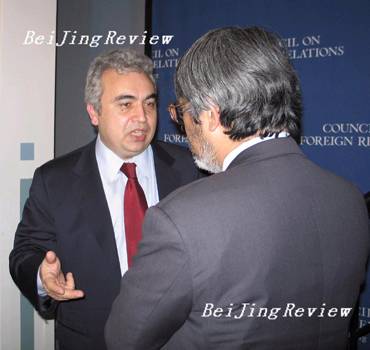
It is unfair to blame China for the increasingly high oil demand around the world, said Fatih Birol, Chief Economist and Head of the Economic Analysis Division of the International Energy Agency, on November 17 in New York.
He made the remark at a discussion organized by the New York-based Council on Foreign Relations on the World Energy Outlook 2006 released by the International Energy Agency in London on November 7.
"The demand was high, and China was only part of this demand," said Birol, though, according to the projection in the World Energy Outlook 2006, over 70 percent of the increase in global primary energy demand will come from developing countries, with China alone accounting for 30 percent. But despite the increasing vehicle ownership in China in the past two or three years, "the oil demand on a per-capita basis in China is still very low," said Birol. Today in China, the ratio of car ownership per 1,000 people is 13, while in the United States it is 806, he added.
Meanwhile the economist also pointed out that by 2009, China will overtake the United States as the biggest emitter of energy-related carbon-dioxide (CO2), largely due to the country's huge population and heavy reliance on coal in power generation and industry.
Other developing countries are also increasing their emissions of CO2, which will account for two thirds of world CO2 emissions by 2030, according to Birol. However, he said that the per-capita CO2 emissions of China and other non-OECD (Organization for Economic Cooperation and Development) countries would remain well below those of the OECD countries like Australia, Canada, the United Kingdom and the United States.
According to the World Energy Outlook 2006, "Coal overtook oil in 2003 as the leading contributor to global energy related carbon-dioxide emissions and consolidates this position through to 2030."
Birol called on countries to change their policies to increase energy-use efficiency and also reduce the CO2 emission. He suggested that China should improve its efficiency in electricity use in both industrial and residential sectors and increase efficiency of coal-fired plants, use of renewable energy sources and reliance on nuclear power.
"I should tell you that China is more active in increasing the energy efficiency standard than big countries in the OECD region," said Birol.
The World Energy Outlook is an annual energy-related research publication that has been recognized as the leading source of forward-looking global energy market analysis. This year's energy outlook maps a new energy future, shows how to change the unsustainable energy trends with alternative policies and counts the costs and benefits of energy use.
| 